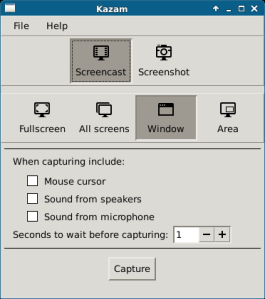I’m working on a bunch of screencasts at the moment (more posts to come) and one of the things that tripped me up the most was getting all the windows the same size, so that the resulting videos are the same size and can easily be put back together. Enter
wmctrl, a very nice linux tool that can do all of this for me.
I’m aiming to have a series of windows all sized at 800×600, and the first step is to look at a list of windows in wmctrl:
wmctrl -lG

The -l switch provides a list, and the -G switch shows the geometry of the windows. This is especially useful if you want to place something on a second monitor, you can look where a correctly-placed window would go and then use those co-ordinates! Also beware that windows positioned at the origin of a desktop space rarely end up where you expect them to go.
To set a new geometry for a window, we use the -e switch to specify what that should be. The format is:
"gravity, X, Y, width, height"
For gravity, try zero. X and Y are the co-ordinates of the top left hand corner of the window, and width and height hopefully you can guess. It’s also acceptable to pass -1 for any of these values for the window to retain its current setting.
To specify a window, we use the -r switch to indicate to wmctrl which window wants the resize. You can give the title of the window, or the identifier shown in the list output, but I found it most useful to use the special value ":SELECT:" and then just click on the window I wanted to affect. Therefore the command I used the most became:
wmctrl -r ":SELECT:" -e "0, -1, -1, 800, 600"
As a final tip, make sure (by resizing the window to something definitely smaller than the desktop it is on) that the window is not maximised – if it is, it will stay that way and you will wonder what you are doing wrong.


